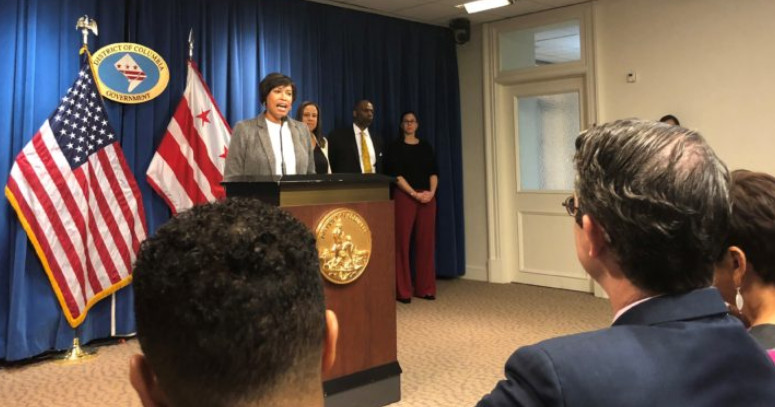House Republicans have long intervened in local District affairs, on issues like legalized marijuana, abortions, guns, and needle exchanges.
But there’s a new boss in town. Now that Democrats will take control of the House of Representatives for the first time since 2010, will there be a weed dispensary on every corner in D.C.?
Newly re-elected Mayor Muriel Bowser says that she is sending a taxation and regulation scheme for marijuana sales to the D.C. Council in the new year.
“We have an untenable situation that I believe makes us unsafe,” Bowser said at a press conference on Wednesday afternoon. Under the legalization law that passed by ballot Initiative 71 in 2014, residents over the age of 21 can possess, purchase, give away, and grow pot for recreational purposes, but cannot sell it.
That’s because, since 2014, Congress has included language in a spending bill that prevents the District from spending any of its funds to create a tax-and-regulate system. Capitol Hill similarly blocked D.C.’s medical marijuana program for a decade using budget riders.
But that was thanks largely to House Republicans, and, “well, that problem disappeared yesterday,” says D.C. Delegate Eleanor Holmes Norton, the District’s lone representative in Congress. She feels confident that she can remove the rider once the Democrats take over. (The Senate is still in Republican hands, but Norton says that’s not as much of an issue. “I’m able to negotiate off riders in the Senate, and I’m going to continue to do that,” she says.)
Bowser declined to go into any more detail about what that tax-and-regulate scheme would look like, or provide specifics on who in her administration is working on it.
The current federal appropriations bill, which will be in effect until October 2019, still dictates that D.C. “shall not enact” any legislation to allow the sale of marijuana (Trump has not yet signed this bill). Legislators can propose amendments to the bill December 4 of this year, but “I don’t know if I could negotiate to remove that rider with Republicans still in charge,” says Norton.
If that rider remains for the 2019 bill, then technically, the city would violate federal law if it held council hearings about legalizing the sale of weed. (In 2015, D.C. Attorney General Karl Racine determined that hearings would constitute a violation.)
D.C. officials have come close to this line so far, but not crossed it. Bowser enacted the legalization of weed in D.C. even after Congressional Republicans threatened her with arrest. And At-large Councilmember David Grosso has now twice introduced a bill to tax and regulate marijuana.
“It would be a violation of federal law to move this bill forward,” Grosso told DCist. “But I believe, quite passionately, that is what is called for in the District of Columbia when our rights are trampled on a regular basis.”
Adam Eidinger, the co-founder of DCMJ who was instrumental in the passage of Initiative 71, says that dispensaries in D.C. are going to be “a 2020 thing, but I think [Bowser] is wise to start talking about it now. I’m really pleased the mayor is putting out ideas now.”
Norton says that Bowser is “already giving a thumb in the eye to Congress by even using staff” to prepare a tax-and-regulate scheme. “It shows you how absurd these rules are. That’s why I’m trying to get D.C. relief.”
Norton is one of the members of Congress with the most to gain from the forthcoming Democratic takeover. She will likely regain her floor vote under a blue House and become the chair of a committee or subcommittee.
“Even if what I have is a subcommittee, I would take the most powerful subcommittee” says Norton, referring to the Highways and Transit Subcommittee, which has jurisdiction over Metro, and is where she currently sits as ranking member.
If D.C. does legalize the sale of marijuana, it’ll join a growing number of jurisdictions doing so. On Election Day, Michigan became the tenth state to pass marijuana legalization, including a forthcoming taxation and regulation scheme.
Credit: dcist.com








